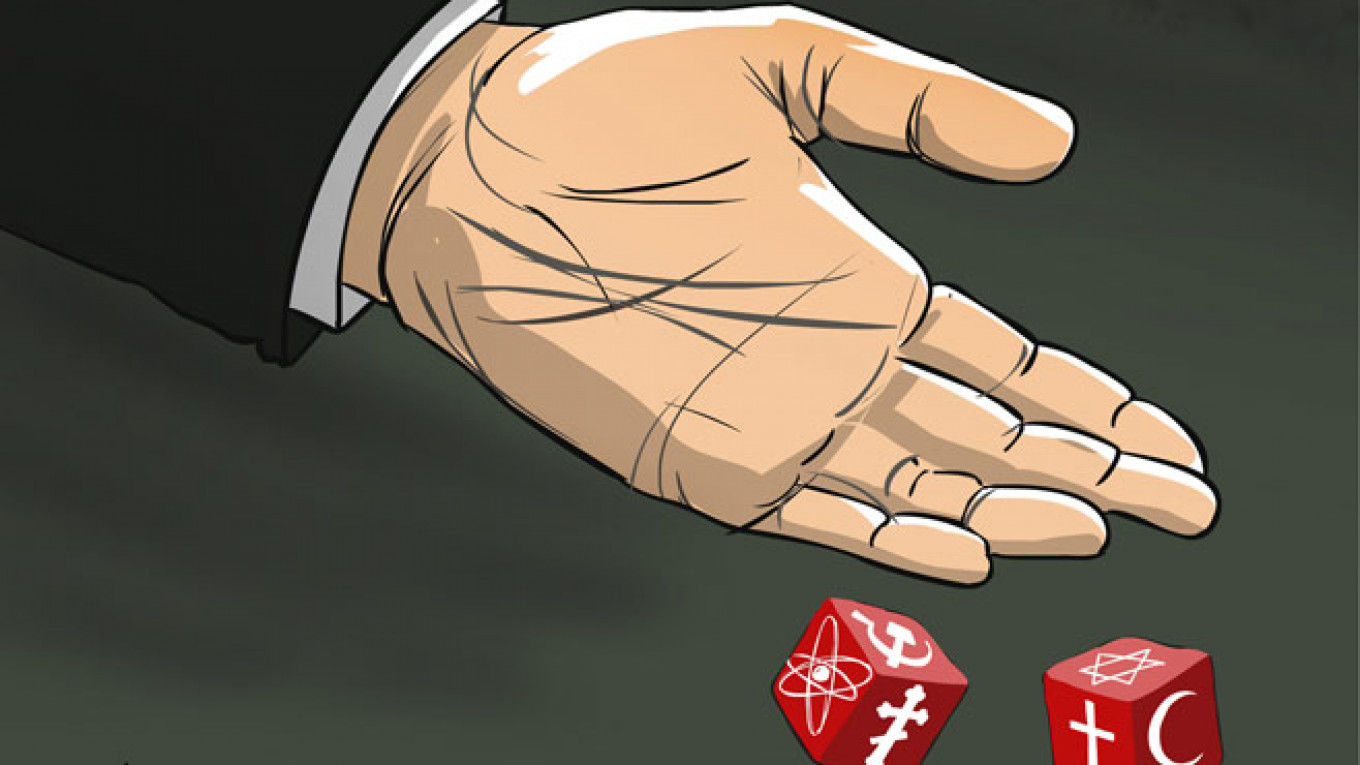How will Europe's human rights court respond to a government that treats a pacifist religious group as a dangerous extremist cell? The European Court of Human Rights (ECHR) will answer that question this summer when it rules on whether Russia's prosecution of Jehovah's Witnesses under its extremism law criminalizes freedom of religion or belief.
A ruling against the Kremlin could be a landmark decision for Russia, affecting not only Jehovah's Witnesses. From Muslims to dissenting members of the Moscow Patriarchate Russian Orthodox Church (MPROC), other Russians are also caught in the wide net cast by this overly broad law.
Under the extremism law, religious material is banned throughout Russia once a higher court upholds a lower court ruling that it is "extremist." Convicted individuals face up to four years in prison. As of this June, Russia's list of banned materials reached 2,859 items, having started in 2007 with 15 items.
The ECHR is reviewing 22 cases of Russian court bans of 72 Jehovah's Witness texts, including a children's book called "My Book of Bible Stories."
Russia enacted its extremism law in 2002, just months after the Sept. 11, 2001 attacks in the United States. Two of the law's provisions defined religious extremism as promoting the "exclusivity, superiority, or lack of equal worth of an individual" and "incitement of religious discord" in connection with acts or threats of violence.
How did these provisions allow Russia to target Jehovah's Witnesses or other peaceful religious minorities?
Officials began to interpret the first provision as promoting the superiority of a belief rather than an individual, contrary to the text's plain meaning. And in 2007, Russia amended the law to allow prosecution for inciting religious discord even in the absence of any threat or act of violence.
Since every group believes its own dogma to be in some sense superior, any group could face an extremism charge. And since inciting "religious discord" is no longer linked to advocating or perpetrating violence, those advocating religious views face potential criminal charges of incitement.
But in practice, the Russian authorities selectively target certain religious groups, including Jehovah's Witnesses. In August 2013, Russia even banned the group's international website — the only nation to do so. In early 2014, a regional court overturned this ruling.
And it was not until May 2015 that the Russian Justice Ministry allowed the Jehovah's Witnesses to operate as a legal community in Moscow — five years after the ECHR ruled against Russia's refusal to do so.
But it is Russia's 20 million Muslims who are targeted the most by the application of the new law, with Muslims sentenced to prison terms despite engaging in peaceful observances and activities.
A court in 2007 banned the Russian translations of 14 Quran commentaries by Turkish theologian Said Nursi due to his asserting Islam's superiority. Five years later, in response to an Orenburg court's ban of 65 Muslim texts issued "by literally all Islamic publishers in Russia," the Council of Muftis protested that this ruling constituted "the revival of total ideological control" reminiscent of the Soviet era.
Although a local court partially overturned this ban earlier this year, it still is unclear what this ruling means in practice. The Council of Muftis is appealing this ban to the ECHR. In September 2013, the Novorossiisk District Court even banned a translation of the Quran itself and ordered its destruction, a ruling that fortunately was overturned three months later.
So why is Moscow targeting these groups?
Russia believes they threaten national security; the Kremlin includes in this term cultural as well as physical threats to the Russian state. It considers the MPROC the nation's chief cultural and religious embodiment and views certain other religious groups as competitors and dangers to Russia's unity. So when Jehovah's Witnesses or Muslims assert different religious views, officials insist Russia is somehow harmed.
But the opposite is the case. With some 185 officially recognized ethnic groups, Russia is far from being a cultural, religious or ethnic monolith. To combat this diversity by suppressing minority religions promises more — not less — chaos and conflict.
Advancing the myth of a monolithic Russian culture by repressing religious minorities also clearly violates the internationally recognized right to freedom of religion or belief. This repression is a major factor driving the U.S. Commission on International Religious Freedom, on which we serve, to designate Russia a serious religious freedom abuser. In March of last year, the European Union reiterated its strong opposition to the law.
Now the ball rests in the European Court of Human Rights. A ruling in favor of the Jehovah's Witnesses will be the latest call to improve both freedom and security in Russia.
M. Zuhdi Jasser is vice chair of the U.S. Commission on International Religious Freedom (USCIRF). Katrina Lantos Swett is a USCIRF commissioner.
A Message from The Moscow Times:
Dear readers,
We are facing unprecedented challenges. Russia's Prosecutor General's Office has designated The Moscow Times as an "undesirable" organization, criminalizing our work and putting our staff at risk of prosecution. This follows our earlier unjust labeling as a "foreign agent."
These actions are direct attempts to silence independent journalism in Russia. The authorities claim our work "discredits the decisions of the Russian leadership." We see things differently: we strive to provide accurate, unbiased reporting on Russia.
We, the journalists of The Moscow Times, refuse to be silenced. But to continue our work, we need your help.
Your support, no matter how small, makes a world of difference. If you can, please support us monthly starting from just $2. It's quick to set up, and every contribution makes a significant impact.
By supporting The Moscow Times, you're defending open, independent journalism in the face of repression. Thank you for standing with us.
Remind me later.






